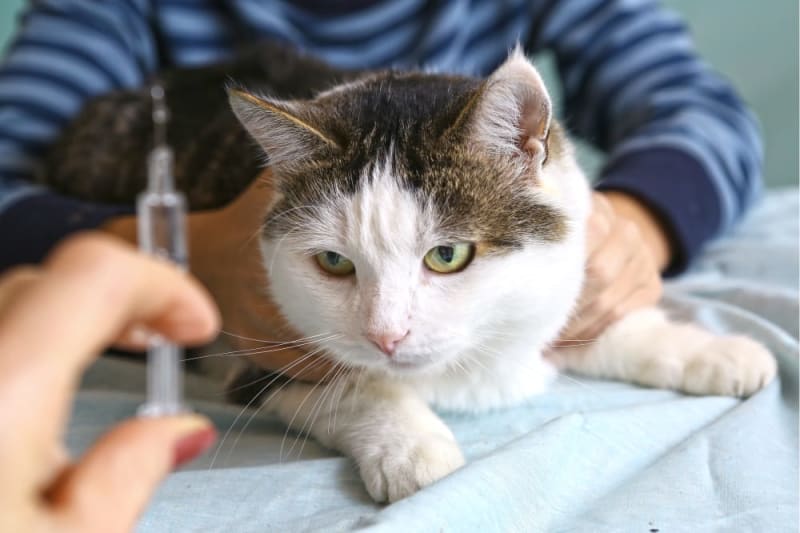Keeping Your Cat Healthy
The best way to make sure your kitty has a long and healthy life is to prevent serious illnesses or catch them early when they are more easily treated.
Bringing your cat to the vet regularly provides your veterinarian with the opportunity to monitor your kitty's overall health, look for the earliest signs of disease, and offer you recommendations for the preventive care products that would suit your feline friend best.
The cost of routine checkups and preventive care can be a concern for our LakeCross Veterinary Hospital veterinarians, especially if your feline friend appears to be in perfect health. However, taking a proactive, preventive approach to your cat or kitten's health now could save you money in the long run.
Physical Checkups for Cats
Taking your cat to the vet for routine wellness exams is like bringing them to the doctor for a physical checkup. As with people, when to take a cat to the vet to have a physical examination depends on their age, lifestyle, and overall health.
Healthy adult cats should have annual wellness exams, but kittens, senior cats, and kitties with underlying health conditions should see their veterinarian more frequently.
Preventive Healthcare for Kittens
For cats less than a year old we suggest monthly exams, with their first veterinary appointment taking place when they are approximately 8 weeks old.
Throughout their first year, kittens require multiple rounds of vaccinations to help protect them from common infectious diseases. Kittens should get the Feline Leukemia vaccine and the FVRCP vaccine which help protect your feline friend from 3 highly contagious and life-threatening feline diseases, Feline Viral Rhinotracheitis (FHV-1) Feline Calicivirus (FCV), and Feline Panleukopenia (FPL).
Your feline friend will be provided with these vaccines over the course of approximately 16 weeks and will go a long way in helping to keep them healthy their whole life.
The exact timing of your kitten's vaccinations will vary depending on your location and the overall health of your furry friend.
Our veterinarians recommend having your kitten spayed or neutered between the ages of 5 and 6 months to avoid a variety of diseases, undesirable behaviors, and unwanted litters of kittens.
Caring for Your Middle-Aged Cat's Health
If you have a healthy adult cat between 1 - 10 years old, we recommend taking them in once a year for an exam. These examinations are yearly physical checkups that are completed when your cat seems to be perfectly healthy.
Throughout your adult cat's routine exam your vet will implement a head-to-tail examination to look for early signs of diseases or other issues, such as parasites, joint pain, or tooth decay.
Your veterinarian will also administer any necessary vaccines or booster shots to your cat, as well as talk to you about your cat's diet and nutritional needs, as well as recommend parasite protection products.
If your vet spots a developing health issue they will explain their findings to you and recommend the next steps.
Geriatric Care for Senior Cats
Cats are typically considered to be senior when they reach 11 years of age.
We recommend taking your senior cat to the vet every six months because many cat diseases and injuries are more common in older cats. All of the checks and advice listed above will be included in your geriatric cat's twice-yearly wellness check-ups, as well as a few additional diagnostic tests to gain additional insight into your furry friend's overall health.
Some diagnostic tests we recommend for our senior patients include blood tests and urinalysis to check for early signs of problems such as kidney disease or diabetes.
Geriatric care for cats also includes a more proactive approach to keeping your feline companion comfortable as age-related issues such as joint pain become more common. If you have a senior cat, ask your vet how often you should bring your pet in for a routine exam.
Note: The advice provided in this post is intended for informational purposes and does not constitute medical advice regarding pets. For an accurate diagnosis of your pet's condition, please make an appointment with your vet.
Is it time to book a routine checkup for your feline friend? Contact our Huntersville vets today to book an examination for your cat.
Looking for a vet in Huntersville and Mecklenburg County?
We're always accepting new patients, so contact our veterinary hospital today to book your pet's first appointment.
Related Articles View All
Is there a natural treatment for hyperthyroidism in cats?
Are you concerned about the side effects of your cat's hyperthyroidism treatment? Are there any natural remedies for hyperthyroidism in cats? Find out in today's blog post.
Treatment for Stomatitis in Cats
Feline stomatitis is an oral health condition that causes inflammation and ulcers in your cat's mouth. Here, you will find information about the symptoms of this painful condition and how it can be treated.
Are cat and dog Wellness Plans worth it?
If you have a cherished four-legged friend you may be wondering if paying a Pet Wellness Plan is worth it. In today's post, our Huntersville vets explain what makes Pet Wellness Plans a great deal for pet parents and their furry friends.
Hyperthyroidism Symptoms in Cats
Hyperthyroidism is a condition that occurs if your kitty's thyroid hormone levels become too high. Left untreated, this common condition in cats can lead to some very serious health problems. Our Huntersville vets explain the causes, symptoms, and treatment for hyperthyroidism in cats.

